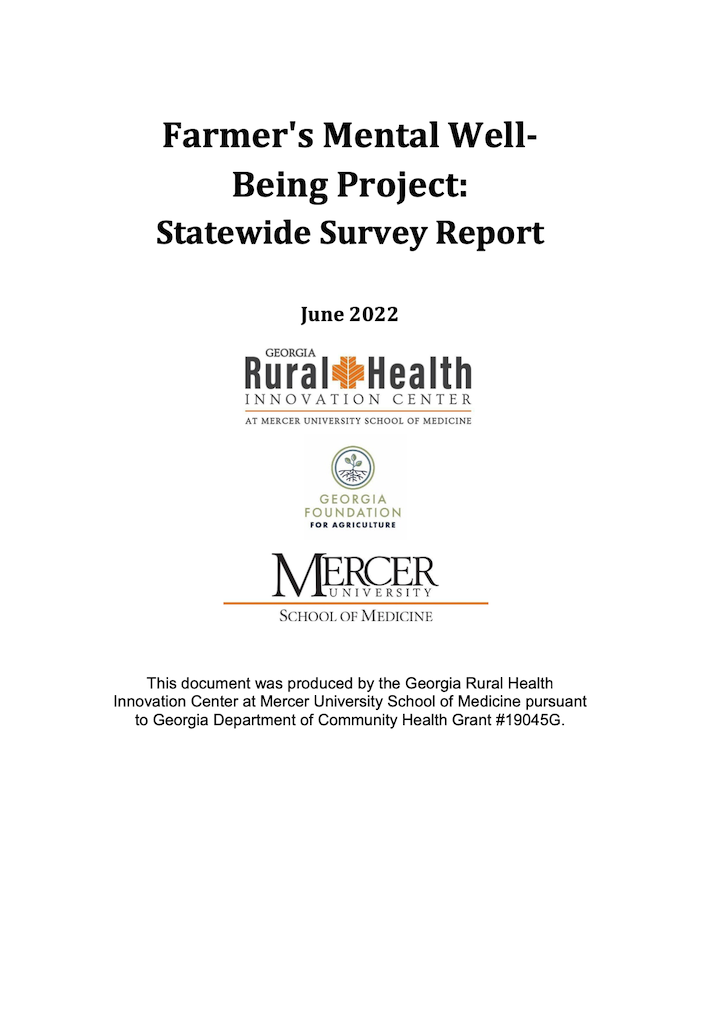MACON – A new study conducted by the Georgia Rural Health Innovation Center, housed in Mercer University School of Medicine (MUSM), and the Georgia Foundation for Agriculture (GFA) sheds light on the overwhelming stress faced by those who work in Georgia’s largest industry.
Agriculture contributes nearly $70 billion annually to Georgia’s economy, according to the University of Georgia Center for Agribusiness and Economic Development. Georgia Farm Bureau indicates that one in seven Georgians works in agriculture, forestry or related fields.
Despite the massive impact of farming across the state, researchers Stephanie Basey, Dr. Anne Montgomery, Ben West, Chris Scoggins and Lily Baucom found very few studies on the overall mental health of farmers.
One previous study published in the International Journal of Environmental Research and Public Health found that of 130 occupations across the U.S., farming had the highest rate of death caused by stress-related conditions and psychiatric disorders, as well as the third-highest suicide rate.
“I don’t think anybody would argue that farming is stressful,” said Basey, a doctoral candidate in MUSM’s Ph.D. in Rural Health Sciences program. “We had heard about mental health trainings for specific professions, but we couldn’t find a baseline for farmer mental health or well-being to inform what that training should look like for farmers. What are their stressors? What are their coping mechanisms?”
The research team conducted its pilot study from May-June 2021. An online survey, completed by 500 farmers, confirmed that farming is a stressful occupation and that farmers’ stressors are varied and many. Based on these findings, the researchers launched a more detailed survey in January that was completed by 1,651 farmers through the end of April.
Within these studies, the term “farmer” refers to farm owners, farm managers, farmworkers, spouses and other farm-related roles such as accountants. The larger study included representative samples by role, race, gender, age and region of the state.
Across all farmers surveyed, 82% reported a moderate level of stress according to the Perceived Stress Scale, a widely used assessment instrument that places respondents in one of three categories: low, moderate or high perceived stress.
Additionally, 49% reported being sad or depressed, 47% reported experiencing loneliness, 39% reported feeling hopeless and 29% reported thinking of dying by suicide at least once per month.
Breaking down the responses based on specific criteria provided further insights, such as farm managers and farmworkers are most stressed while farm owners are least stressed.
Most shocking is the mental health toll faced by first-generation farmers. Some 61% of first-generation farmers thought about dying by suicide in the past 12 months, compared to 10% of generational farmers. This disparity also exists in thinking about suicide at least once per month (46% of first-generation vs. 12% of generational) and thinking about suicide daily (9% of first-generation vs. 1% of generational).
“If people only take one thing from this study, it needs to be the level of stress that first-generation farmers are facing,” added Basey. “We’re at a crisis level.”
‘One of the hardest things someone can do’
Trey Bouwsma began working on his stepfather’s commercial broiler and cattle farm in the northeast Georgia town of Comer at the age of 13.
His responsibilities quickly progressed from setting up chicken houses and putting out minerals and hay for the cattle to daily mortality pickups in the chicken houses.
“There were eight broiler houses that had to be walked up and down every day,” he said. “It would easily take me about eight hours a day, seven days a week to do this. I can probably cut that time in half now that I am older, but there are still no days off. You learn quickly that live animals do not care if it is a holiday or special event, tending to the animals is always the No. 1 priority.”
By the time Bouwsma moved away to attend Abraham Baldwin Agricultural College in Tifton, he had accepted a more managerial role on the farm. He intended to return home to run the farm upon earning his Bachelor of Applied Science degree in diversified agriculture.
However, three months after he graduated, the broiler houses were shut down, and the farm was sold. Since then, he has been looking into buying his own broiler farm while holding several jobs in the poultry industry, including commercial broiler farm manager, feed mill assistant manager and broiler and breeder service technician.
In his current role, he acts as a liaison between the poultry company and the contract grower.
“I interact with poultry producers on a daily basis, and many producers vent to me about the struggles of being a farmer. I believe part of my job is to listen and offer encouragement when I can,” he said. “Whether it is livestock or crops, the Georgia farmer will always face multiple stressors. All farmers rely on things such as weather, which they have zero control over. There are so many variables; I honestly wouldn’t know where to start. Unfortunately, most of the farmers I know and come in contact with have a very high stress level.”
Bouwsma believes more access to young farmer or first-time farmer grant or loans, in addition to educational resources on finances and economics would be beneficial to those in the farming industry, particularly first-generation farmers.
His wife, Morgan, agrees and hopes that the information gleaned from the survey will encourage legislators to develop policy that will make it easier for farmers to get help when needed, help first-generation farmers start farming without going into “unfathomable” debt and create a more equitable market for anyone wanting to farm, whether it be on a small or large scale.
“Farmers are one of our most treasured assets since they provide some aspect of many basic human necessities, but historically it seems that they have not been taken care of mentally, physically or financially,” said Morgan. “If farming was easy, there would be a lot more people doing it. Instead, there is less than 1% of the population upholding the other 99% with all these things that we need. It’s an expensive venture and risky work, especially as a first-generation farmer when you’re really starting out entirely on your own.”
“Growing up in and around farming, I am not shocked one bit about the stress load faced by first-generation farmers,” added Trey. “One of the hardest things someone can do is be a first-generation farmer. Starting out with no family land, you pretty much have to pay to play. To raise chickens specifically, you’ve got to have a huge down payment or land to put up as collateral. People are putting up all their savings, any inherited land or money, and ending up with high interest rates all just to farm. You also are never guaranteed the next flock. The only real sense of job security is if you are performing well each flock compared to other producers.”
Next steps
Basey and Dr. Montgomery, assistant professor, biostatistician and assistant director of the Ph.D. in Rural Health Sciences, presented their findings May 17 at the University of Georgia Cooperative Extension Farm Stress Summit in Tifton to an audience of farmers, academics, health care providers, faith leaders, elected officials and others.
“You could hear audible gasps in the audience when we shared some of our findings,” said Dr. Montgomery. “The response confirmed that this data is needed, and this project is necessary. Farmers want to have these conversations.”
The next steps will be to use the resources of the Georgia Rural Health Innovation Center and Georgia Foundation for Agriculture to hold interviews and focus groups with farmers and ultimately design specific interventions supported by the results of the survey.
The researchers have also begun to develop academic journal articles based on their findings and plan to continue to present to local, regional and national organizations focused on agriculture, public health and other related fields.
GFA was founded by Georgia Farm Bureau in 2014 to prepare the next generation of farmers and agricultural leaders for success in agriculture. As part of its five-year strategic plan launched in 2019, the foundation created a new program area called HARVEST to solve challenges for active farmers and address barriers to entry for new and beginning farmers.
GFA will meet in August for a three-day planning session with members of the Georgia Farmer Mental Health working group to share updates on ongoing projects and develop coordinated action steps amongst partners, which include the Georgia Department of Agriculture, Georgia Department of Behavioral Health and Developmental Disabilities, University of Georgia Extension and UGA’s School of Social Work, Institute of Human Development and Disability, College of Agricultural and Environmental Sciences and College of Family and Consumer Science.
Additionally, the foundation will announce a plan later this year to test solutions and empower leaders at the local level with the skills they need to support farmers in their communities, including new trainings for local agricultural leaders and better resources for Georgia farmers.
“The average age of the farmer in Georgia is 58. We need to protect and help our young farmers and first-generation farmers – the future of agriculture in Georgia is dependent on this,” said Baucom, executive director of the Georgia Foundation for Agriculture and a co-author on the study. “The Georgia Foundation for Agriculture was happy to partner with Mercer and the Georgia Rural Health Innovation Center to find out just how widespread these issues are.”
About the Georgia Rural Health Innovation Center
In 2018, Georgia lawmakers dedicated special funds to establish a new Rural Health Innovation Center tasked with confronting the complex health care challenges and wellness disparities facing rural communities. Mercer University School of Medicine (MUSM) was awarded the grant funds in 2019 and formally established the Georgia Rural Health Innovation Center on its Macon campus. MUSM boasts a longstanding commitment to serving rural Georgia’s health needs, with a mission to educate physicians dedicated to tackling the health challenges in rural Georgia. The Rural Health Innovation Center serves as a critical resource to rural communities to improve access and effectiveness of health care by offering research, collaboration, and training opportunities.
About the Georgia Foundation for Agriculture
The Georgia Foundation for Agriculture is a 501c3 non-profit organization. They are developing a pipeline for Georgia’s next generation of farmers and agricultural leaders. Through early exposure to agriculture, classroom learning, higher education, farm-based mentorship, and professional learning, their programs provide a structured path that fosters growth and sparks passion in agriculture during one’s educational journey.
Featured photo by Bekah Howard










